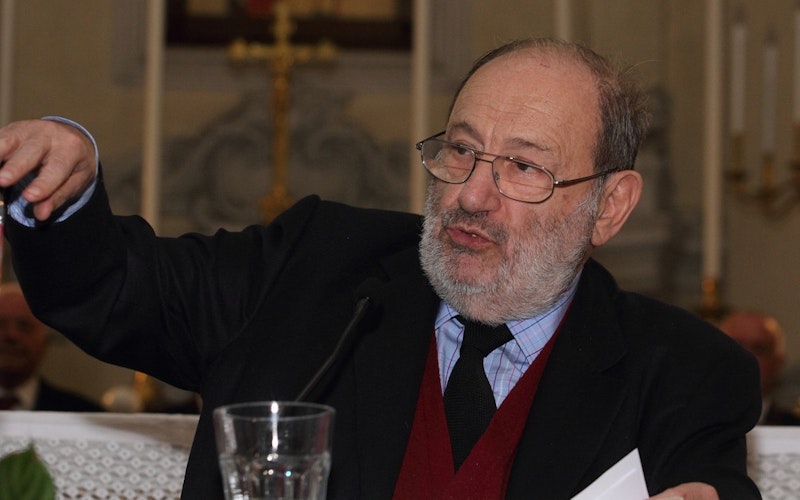
Culture At Large
Remembering Umberto Eco
For those familiar with the work of Umberto Eco, news of his death on Feb. 19 betokened the passing of a literary era. One of Europe’s foremost public intellectuals and a “grand old man” of post-war Italian humanism, Eco was one of the last surviving members of the mid-century generation of writers that reshaped the Western literary and philosophical landscape. A peer of Jacques Derrida and Roland Barthes, Eco participated in the debates that led to the rise of such esoteric disciplines as semiotics and deconstruction while simultaneously finding fame as a novelist — which has led many to consider him as little more than a commodified, postmodern figurehead.
Yet Eco’s part in the development of the postmodern worldview was markedly unlike the majority of his colleagues. “Postmodernism” has become synonymous with ideologies that proclaim all meanings and all perceived reality to be subjectively constructed and with only relative value. Eco, however, while identifying himself as a postmodern thinker, refused to accept that true meaning is impossible to find or that interpretive acts are necessarily valueless. In such books as The Limits of Interpretation and The Role of the Reader, he expounded a philosophy of communication that engaged with the radical new ideas about meaning without giving up too much ground. For Eco, language can be fluid or effervescent while still corresponding to an intelligible external reality. Words can encompass infinities, yes, but infinities of depth rather than of possibility. This balancing act should make him an intriguing figure for the Christian trying to weigh these philosophical questions. Our witness relies on the truth and power of words (and the Word), a commitment that is irreconcilable with many ideas associated with the postmodern movement.
Eco’s work ensures that dialogue on meaning and interpretation remains open for Christian scholars.
At the same time, Eco certainly made no secret of his own lack of religious convictions. As recently as a 2005 essay for the Telegraph, he argued that, while he had a “profound respect” for Christianity, the sole purpose of religion was to help individuals come to terms with the inevitability of their own death. Ironically, however, the same skepticism that caused him to look askance on the demands of sincere Christian belief resulted in a lifelong obsession with the rationales for and consequences of beliefs in general. For Eco, beliefs, as knowledge claims, will always have real consequences as the believer’s understanding of the world manifests in his or her life. Therefore, since no neutral beliefs exist, even beliefs that one does not personally hold should still be taken seriously. A witness to the excesses and irrationalities of late Italian fascism, Eco knew firsthand the terrible power of a cultural falsehood. In this spirit, many of his essays and novels betray a deep fascination with the poorly reasoned and dangerous beliefs of conspiracy theorists and other “true believers.” Foucault’s Pendulum, for example, constitutes contemporary literature’s most damning critique of educated gullibility, populated by a menagerie of characters whose wrongheaded convictions leave them capable of only self-destruction.
The legacy of Eco’s sprawling work is threefold: first, he models for us the maxim that no amount of education or natural genius can confer salvation. A man may reach the point of loving the church’s piety and its peace and yet lack the faith to submit to her Lord. Second, Eco’s theoretical work ensures that entry points into contemporary dialogues on meaning, interpretation and the nature of language remain open for Christian scholars, even in a philosophical milieu which seeks to exclude any truth claims. His simple yet radical conviction that words can mean is more than a point of commonality; in the postmodern battle over the nature of words, it places him on the side of the realists, the traditionalists and the confessing Christians. Third, throughout his impressive career, Eco modeled a spirit of grace, humility and generosity that few men of his erudition have matched. His beloved How to Write a Thesis, which finally became available in English last year, remains the single most grandfatherly guide to academic life in any language. He was a lifelong teacher, mentor and public servant, and one of the most gracious and grounded intellectuals in living memory. We should be sorry to see him go.
Topics: Culture At Large, Science & Technology, Philosophy, News & Politics, World